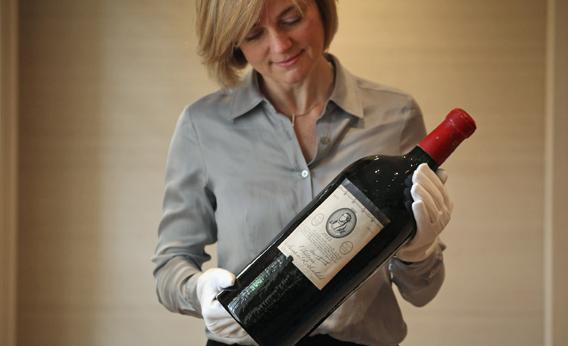Testimony began this week in billionaire William Koch’s lawsuit against Eric Greenberg, who Koch claims sold him some very expensive counterfeit wine. (Mike Steinberger wrote a detailed investigation of the case for Slate in 2010.) Some of the bottles went for nearly $30,000, which has Koch so miffed that he refuses to settle the case. If you spend $30,000 on a bottle of wine, can you expect it to be better than a $20,000 bottle or a $10,000 bottle?
Not really. Full disclosure: The Explainer has never tasted, and has no discernible prospects of ever tasting, a $10,000 bottle of wine. The wine experts he consulted, however, emphasized that the difference between wines in this price range is not quality, but rather prestige, rarity, and age. Upon opening, some four- or five-figure bottles of wine “justify” their price—at least to experienced wine critics and people who can conceive of paying $30,000 for 1.5 liters of fermented grape juice. (A 1947 Cheval Blanc, for example, blew away Slate’s wine critic.) Other bottles have slid far beyond their peak, losing their volatile fruit flavors to age and, frequently, improper storage. Occasionally, giddy wine lovers uncork an ultra-expensive wine only to find that it has turned to vinegar. As wine enthusiasts say, there are no great wines, only great bottles. However, just like a high-roller going all in at the poker table, some wealthy wine lovers perceive value in unpredictability.
It’s difficult to say how much of an ultra-expensive wine’s price is explained by expected quality and how much of it has to do with other factors. In some cases, it’s not about the juice at all. One of the most expensive wines ever sold was marketed as part of Thomas Jefferson’s personal stash, selling for approximately $150,000 at auction. While the Jefferson bottles are now widely considered frauds—poor William Koch owns some of these as well—their selling price was based on historical value, not presumed flavor. The buyers never even intended to drink them. After winning a bottle at auction, Christopher Forbes noted, “It’s more fun than the opera glasses Lincoln was holding when he was shot. And we have those, too.”
In other cases, buyers clearly intend to impress their wealthy friends with the experience of quaffing a delicious rare vintage. Consider the (probably fake) 1921 Château Pétrus that is now the subject of William Koch’s lawsuit. As Steinberger described in his investigation, a double magnum of the stuff sold for just $6,800 in 1991. Four years later, renowned critic Robert Parker awarded the wine a perfect score, and the price jumped. In 2000, a magnum sold for $10,000, and Koch paid nearly triple that amount in 2005. A rapidly growing base of wine-loving billionaires was responsible for some of that increase, but much of it can be attributed to Parker’s endorsement of the vintage’s quality.
A portion of a super-expensive wine’s price can also be attributed to the egos of billionaires. The wealthy are often willing to pony up laughable sums not for the hope of a good return, or even for a night of fine drink, but for the priceless rush that only the smash of an auction gavel brings. That leads to another point that wine critics bring up when discussing this category of wine—many wine connoisseurs detest the recent spike in high-end wine prices. Astronomical price tags shut most true wine lovers out of the market.
Mindset greatly affects your enjoyment of an expensive bottle of wine. For many buyers—even the super-wealthy—spending tens of thousands of dollars on a single bottle of wine can generate anxiety or a touch of buyer’s remorse. Worries about the wine’s ability to live up to expectations, whether they’ve paired it with the right food or uncorked it at the proper moment take all the joy out of the occasion.
Growing concerns about counterfeiting also affect a high-end wine tasting, in the same way that the specter of performance-enhancing drugs has taken some of the wonder out of being a sports fan. Even if an expensive wine is enjoyable, nagging doubts invariably taint the experience.
Got a question about today’s news? Ask the Explainer
Explainer thanks Eric Asimov of the New York Times, Jamie Goode of Wine Anorak, wine critic Jancis Robinson, and Mike Steinberger of Wine Diarist.
